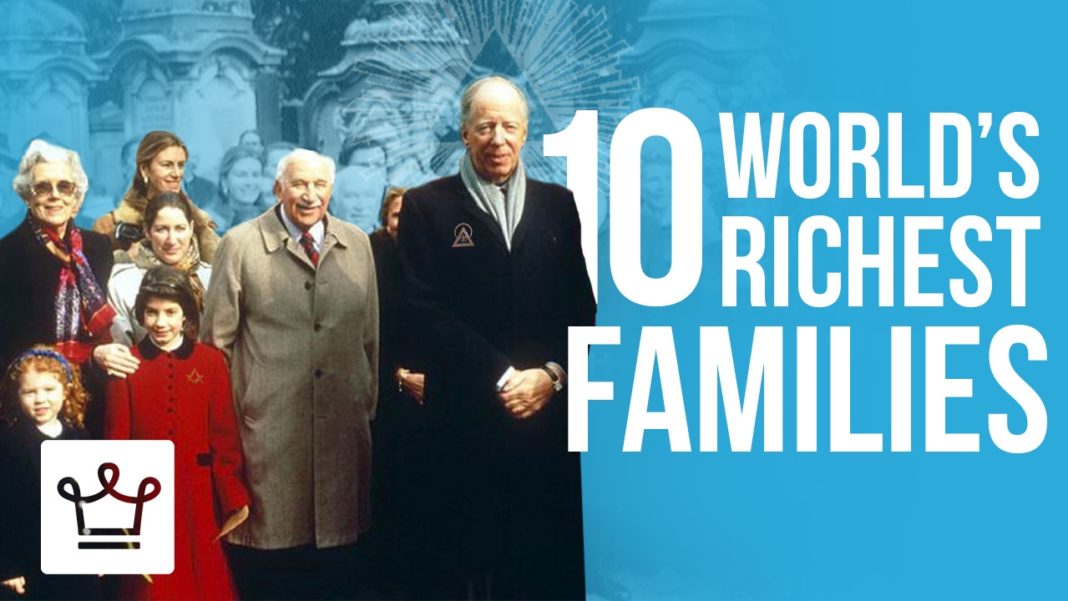Regardless of your particular financial status, keeping tabs on the ultra-rich—whether with admiration, envy, or resentment—is perhaps more pleasurable and less demanding than researching a mortgage, or shopping for online brokers, or getting schooled on complex topics in finance and economics like how exchange-traded funds work and the pros and cons of GDP.
To be sure, the appeal of wealthy families reflects a culture that fetishizes wealth and lionizes the rich. The upper echelon of business leaders is a kind of celebrity, as scrutinized for their ability to perform as athletes, actors, and politicians.
Successful family businesses may offer a universal appeal. Few of us will ever become billionaires, but everyone has a family. What’s more, family businesses imply values of authenticity, tradition, heritage, lineage, and quality. And wealthy families suggest royalty, especially if the wealth is intergenerational.
For the sake of simplicity, we have limited our list of richest families to those groups who originally made their fortunes through business, even if some heirs who still enjoy the money haven’t been employed in the business. The fortunes given are in a range because fortunes fluctuate daily with the markets, and it matters how you count it up. The most recent updates to these figures occurred between late 2018 and early 2019.
1. Walton Family – Walmart
Estimated Wealth: $190.5 billion
The Waltons are the richest family in America and by some measures the wealthiest clan in the world. At the top of the value chain, in 2019, Jim and Alice Walton are each worth more than $44 billion and ranked #16 and #17, respectively, on Forbes annual list of billionaires. Walmart is a retail behemoth.
Founded by Sam Walton in Arkansas in 1962, Walmart is now the world’s largest company, by 2019 revenues, with $514.4 billion, and over 1.5 million U.S. associates, according to its corporate website. If those people constituted their own city, it would be the fourth most populous American city, after New York, Los Angeles, and Chicago. The company operates nearly 12,000 retail stores worldwide and 5,362 stores in the U.S., as of August 2019.
Best known for big box stores in rural and suburban America celebrated for its low priced products, and excoriated for its labor practices, the company failed to bring its big-box consumer lifestyle to New York City, unlike its competitor Target.
2. Mars Family – Mars
Estimated Wealth: $126.5 billion
Mars is the Walmart of candy: a multigenerational family business that is ubiquitous, cheap, and popular. Today the company is better known for making M&Ms than for its eponymous Mars bar. In 2017, the world’s largest candy company diversified with the purchase of VAC, a pet care company, for $7.7 billion.
Siblings Jacqueline and John Mars, whose grandfather Frank Mars founded the company, each has a net worth of $23.9 billion, tied for #33 in 2019 on the Forbes annual list of billionaires. The company is now being run by some of their children, the fourth generation of Mars family members. Sweet!
3. Koch Brothers – Koch Industries
Estimated Wealth: $124.5 billion
Charles and David Koch owe their staggering fortune to an oil business founded by their father, but today are perhaps better known to the general public for their politics, digging into their deep pockets to place their stamp on politics: financing candidates and libertarian think tanks, funding university professorships, and lobbying for policy positions, all aimed at furthering a conservative agenda. The brothers are worth an estimated $50.5 billion each, tied for the #11 spot on Forbes billionaire list.
4. Al Saud – Saudi Royal Family
Estimated Wealth: $100 billion
The House of Saud, the Saudi royal family has a monarchical history extending back nearly a century. The family’s massive fortune, estimated at $100 billion, has grown thanks to decades of payments from the Royal Diwan, the king’s executive office. Ties with Saudi Aramco, the world’s most profitable company and a behemoth of the oil industry, ensure that the Saudi royal family continues to accumulate wealth. It’s difficult to accurately assess the wealth of the House of Saud, in part because the family contains as many as 15,000 extended members, many of whom have founded businesses, received government contracts and more.
5. Wertheimer Family – Chanel
Estimated Net Worth: $57.6 billion
French high fashion house Chanel is legendary for the timeless “little black dress,” the No. 5 perfume, and the deceased, high-profile designer Karl Lagerfeld, who died on February 19, 2019. Brothers Alan and Gerhard Wertheimer now co-own the company that their grandfather staked with founder Gabrielle Coco Chanel.
6. Dumas Family – Hermès
Estimated Wealth: $53.1 billion
French fashion house and luxury purveyor Hermès has dazzled the world with its signature scarves, neckties, and perfumes as well as its iconic Kelly and Birkin handbags. Back in the 19th century, Thierry Hermès fashioned riding apparel for the aristocracy. Today, the company adorns basketball royalty, LeBron James. Fusing old school and new technology, a line of Hermès Apple Watches sells for $1,300 to $2,000 and up apiece. Axel Dumas currently serves as the company’s CEO and chairman, and Pierre-Alexis Dumas is the artistic director.
7. Van Damme, De Spoelberch and De Mevius Families – Anheuser-Busch InBev
Estimated Wealth: $52.9 billion
These three Belgian brewers have a history in the beverage industry extending back more than 500 years. The Van Damme clan joined the efforts of the De Spoelberch and De Mevius families in 1987, when Piedboeuf and Artois merged to form Interbrew. Together, these three families have an estimated fortune of close to $53 billion.
8. Boehringer, Von Baumbach Families – Boehringer Ingelheim
Estimated Wealth: $51.9 billion
Boehringer Ingelheim is a German pharmaceuticals company with more than 130 years of history. The Boehringer family, along with the Von Baumbachs, remain in control of the company several generations later. All told, these two families possess fortunes totaling just under $52 billion.
9. Mukesh and Anil Ambani – Reliance Industries
Estimated Net Worth: $50.4 billion
Indian industrial conglomerate Reliance Industries, the only Asian company on our list, can be the least well known to average readers. Nevertheless, CEO Mukesh Ambani, whose late father founded the company in 1957, is #13 on Forbes 2019 list, overseeing the company’s refining, petrochemicals, oil, gas, and textiles; his brother Anil manages telecommunications, asset management, entertainment, and power generation. Anil’s elder son, Anmol, is the executive director of Reliance Capital.
10. Cargill, MacMillan Families – Cargill
Estimated Net Worth: $42.9 billion
Sixth-generation Cargill and MacMillan family members oversee Cargill Inc., among the largest closely held companies in the U.S. Cargill is a commodities giant which began in Iowa more than 150 years ago. With operations spanning industrial, agriculture and food products and services, the company is now based in Minneapolis.
The Bottom Line
While wealthy dynasties have been embedded in politics for centuries, it doesn’t seem coincidental that the allure of wealthy family lists coincides with the presidency and digital omnipresence of Donald Trump, whose wealth originated in his father’s New York real estate business, and whose daughter married the real estate scion Jared Kushner, both now in the White House inner circle.
Admittedly, this list may read as a naked celebration of wealth at a time of rising global inequality and the vanishing middle class; a belated pop-culture rehash of Thomas Piketty; or an implicit condoning of heedless consumption at a time when the future of wealth itself is in question due to technological disruption and climate change.
Moreover, our focus on families means we don’t include the world’s three richest individuals. Bezos, Gates, and Buffett do not appear on our list, though technically they all have families. So be it.

























